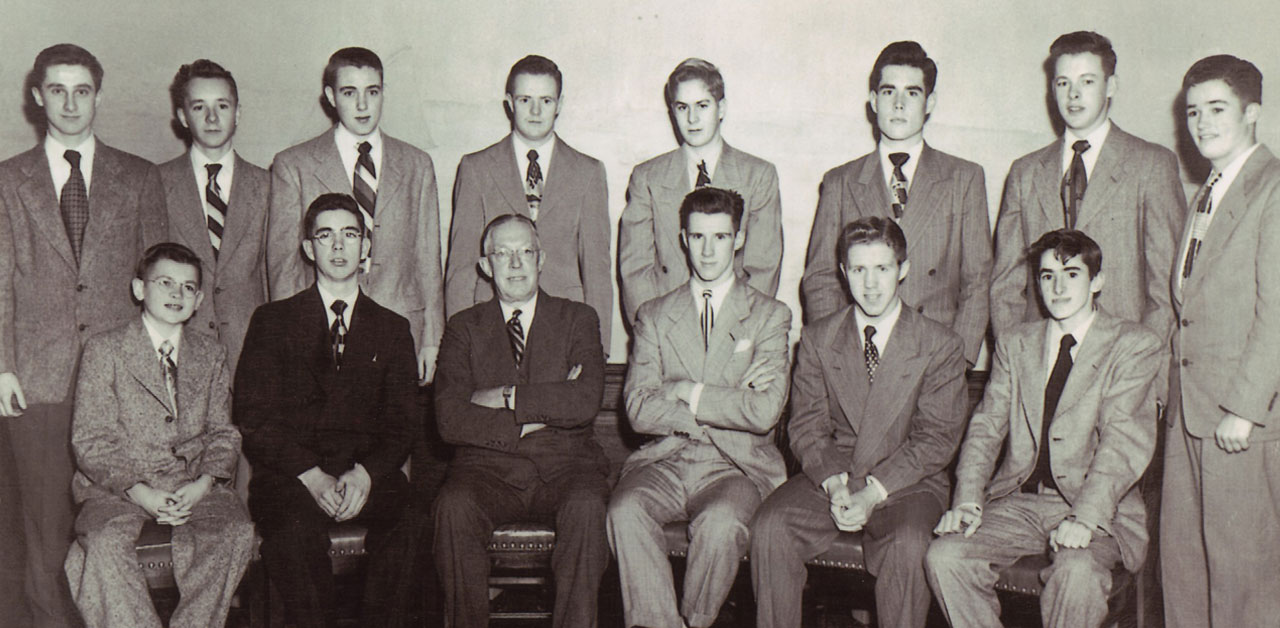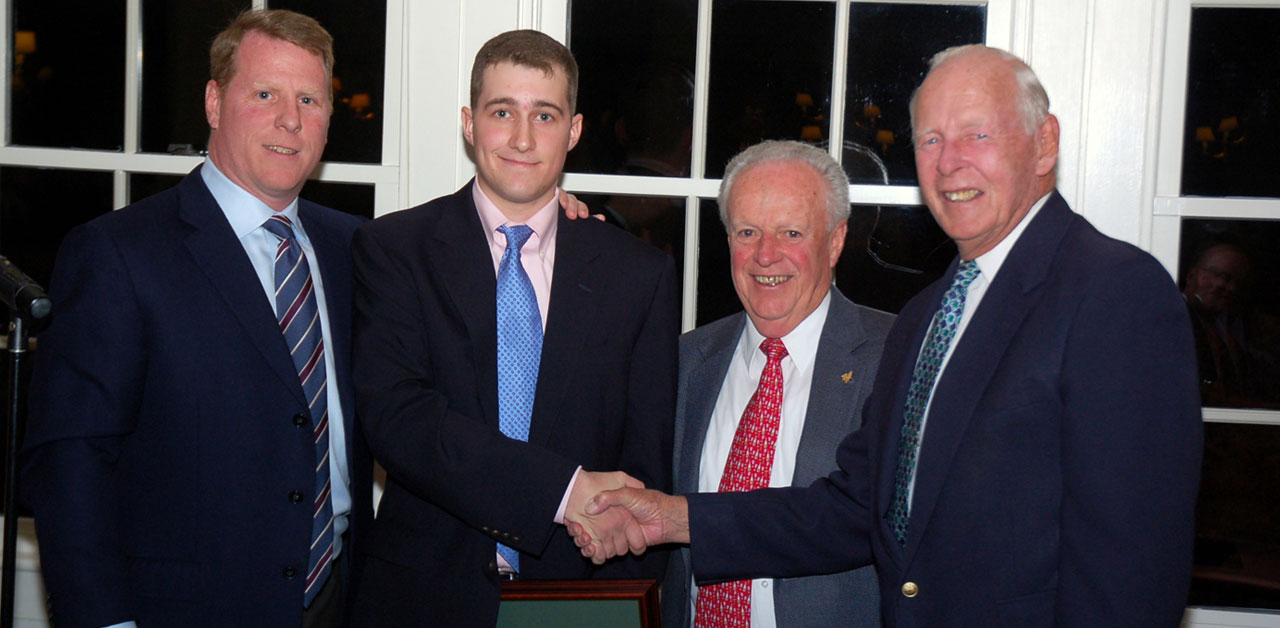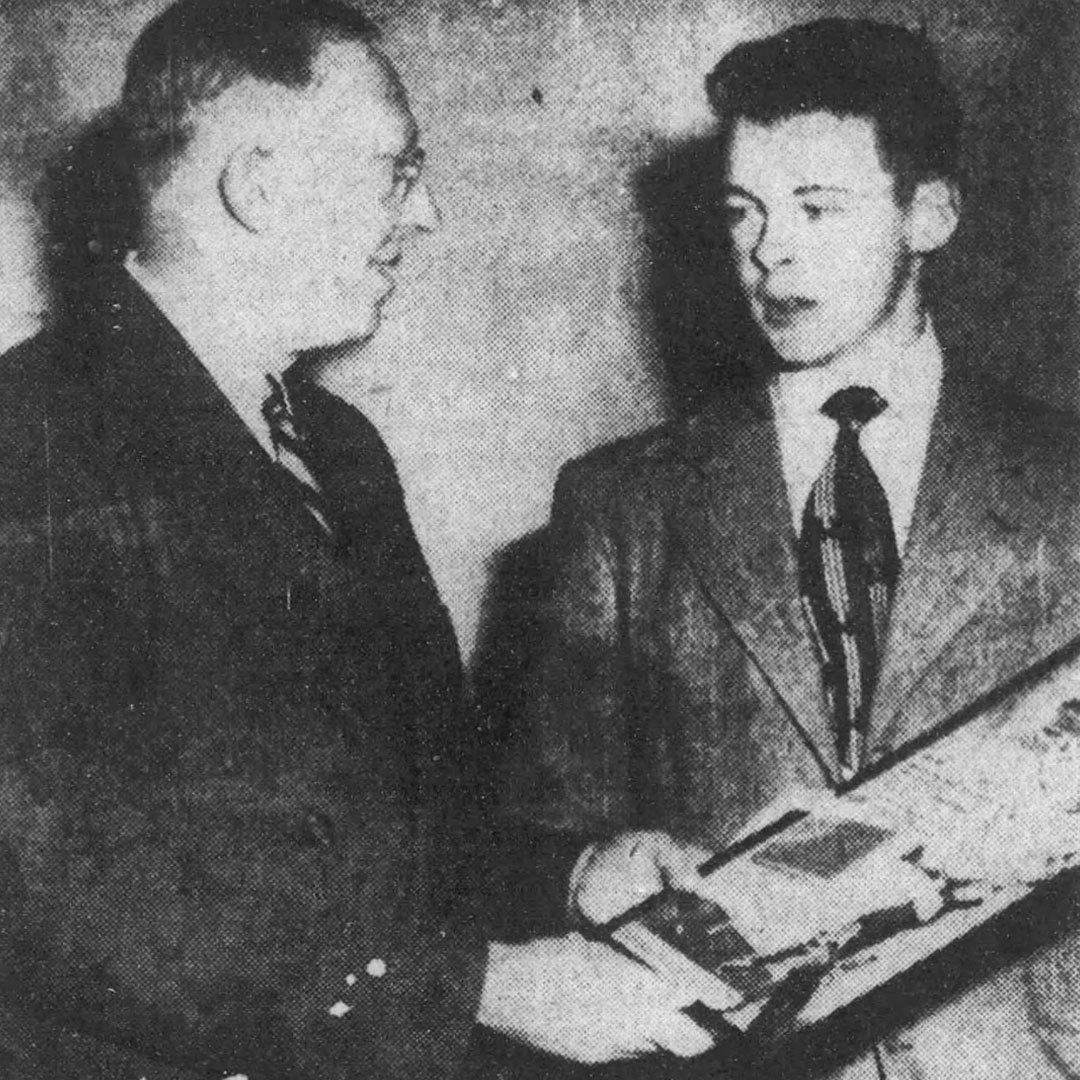While walking through the ornate clubhouse at Charles River Country Club, the light gray eyes of former club president Bob McDonald light up as he gazes at a portrait on the wall of Francis Ouimet.
McDonald holds great admiration for Ouimet, who is most heralded for his upset victory in the 1913 U.S. Open at The Country Club, where the then-20-year-old Brookline native defeated Harry Vardon and Ted Ray, two of the world’s best players at the time.
But McDonald remembers Ouimet as a prime example of a gentleman. He was kind, honest, told great stories, and had a genuine interest in other people’s lives. Throughout Ouimet’s life, McDonald never referred to him informally. “I always called him Mr. Ouimet,” McDonald, 84, recalls. “I had too much respect for him.”
Decades before his death in 1967, Mr. Ouimet lent his name to something that changed McDonald’s life forever. In 1949, McDonald was among the first 13 individuals to receive college scholarships from the newly-formed Francis Ouimet Scholarship Fund. This caddy scholarship fund was started by Friends of Francis Ouimet within what was then the Massachusetts Golf Association (MGA) and has helped scores of local youths finance their college education. Ouimet reportedly told his friends that the scholarship fund was his greatest honor.
McDonald used his scholarship to attend the Massachusetts Institute of Technology (MIT), where he became captain of the golf team, and more importantly, the first in his family to attend college.
“For me, it was the difference between going and not going to college,” McDonald said. “It was a starter for me. Anybody who receives the scholarship probably feels the same way.”

McDonald is forever rooted in the legacy of both Charles River Country Club and the Ouimet Fund. A past president of the club, he’ll be recognized as the honorary starter when the 54th Annual Ouimet Memorial Tournament gets underway Wednesday and Thursday at Charles River, where Ouimet became the club’s first honorary member and spent many weekends playing with close friends.
McDonald’s health prevents him from playing golf anymore, but he’s forever grateful for the sport. It helped pull his family through tough times, allowed him to attend college and have a successful life, and it’s a shared bond within in family. He’s served The Ouimet Fund as a Board Member and Trustee and has helped it blossom into what it is today: 165 endowed funds totaling over $22 Million (as of 2020). Since 1949, over $40 million combined has been given to 6,180 Ouimet Scholars.
“Bob continues to be a strong advocate for amateur golf, The Ouimet Fund, Charles River Country Club and so many important causes in the community,” said Colin McGuire, Executive Director of The Ouimet Fund. “The Ouimet Fund is fortunate to have Bob McDonald as a proud and loyal Alumnus.”
McDonald grew up the youngest of two brothers in a working-class family in Jamaica Plain. Though they both enjoyed playing sports in their neighborhood, their start in golf, specifically caddying, came out of necessity more than anything.
On Sept. 26, 1942, McDonald’s father died, and three weeks later his paternal grandmother also passed. According to McDonald, his mother then became responsible for a mortgage even though she had less than $100 to her name and wasn’t working.
“We had to find something to contribute more to the family,” said McDonald, who was 10 when his father died.
McDonald and his brother ran into a childhood friend who had caddied at The Country Club, and McDonald and his older brother Jack decided to give it a shot. It wasn’t that simple, as back then, adult men used caddying to provide for their own families.
“They didn’t like little kids taking their totes,” McDonald said.
But McDonald eventually got his opportunity as many of the caddies over 18 were enlisted to serve during World War II, giving the adolescents a chance to gain experience, and most importantly make some money. He also became close friends with fellow caddy Jack Lynch, who later became club president of Charles River.
Even the ostensibly paltry sum of $1.05 per bag was enough to do their part. McDonald’s mother eventually earned a job working for the City of Boston and the family was able to get by with a decent standard of living.
When they weren’t caddying, the McDonald brothers would trek two miles and sneak on to Franklin Park and play the holes farthest from the clubhouse. Once in a while, a patrolman would chase them off. “I was a good putter until I had to ditch my putter one day,” Bob recalls.
Eventually, Jim worked his way into working in the pro shop up through joining the national guard and eventually college, while Bob stuck to caddying. He became a regular caddie for Charles Mason and Durham Jones, the latter of whom donated his old iron set to McDonald to use to compete in state junior and state caddie tournaments.

In June 1949, a notice was sent out about a new scholarship fund being formed by Friends of Francis Ouimet, which was financed by the MGA to help caddies attend college.
McDonald had thought about college and growing up, found his passion in construction. He drew model airplanes and once tried to build a kayak in the basement. “Anything around the house that had to be done, I tried to do it,” McDonald said. “I was called the little mechanic.”
He attended Cathedral High School, and a nun once recommended he attend Boston College, a Jesuit school, saying it was the best engineering school in the East. But McDonald had other thoughts and set his sights on MIT, a school he figured he’d put his two main interests to good use.
Fortunately for McDonald, Charles Mason and others he knew were involved in the selection process and sponsored McDonald’s scholarship. He received the news in a telegram, saying he’d been selected to receive the scholarship.
“That was a big day for me,” McDonald said. “I don’t think it said how much, but my mother was ecstatic.”
The first grant from the Ouimet Fund was $4,600 for the 13 young men selected, but it was enough to help McDonald pay his way through college. During a dinner at the University Club of Boston to recognize the scholarship recipients, McDonald got to personally meet Ouimet for the first time. All 13 recipients signed a poster for Ouimet, but McDonald was the one who got to present it to him.
Despite a rocky start in his first year, McDonald hit his stride when he entered the building and engineering program and joined the men’s golf team during his second year. By his junior year, he was working 30 hours a week, playing golf, and completing his coursework. After serving in the Air Force, he was accepted into Harvard Business School and then proceeded to join ERLAND Construction, where he became the company’s second president and grew the company’s portfolio to include clients such as his alma mater MIT.
McDonald’s son Steven succeeded his father as president in 1997, with McDonald fully retiring in 2008.

These days, you won’t find McDonald on the golf course often. Now an octogenarian, he’s been diagnosed with Chronic Obstructive Pulmonary Disease (COPD), which makes any sort of golf activities long and strenuous.
“I would love to be able to go out and hit golf balls,” McDonald said. “If I tee it up and stand up to address the ball, I have to stop for about 30-60 seconds, while I get my breath back. Just walking from a cart to the green wears me out.”
Though he’s limited in what he can do now, there’s no shortage of great stories about McDonald’s time at Charles River, where he became a member in 1963. Like Ouimet nearly a century prior, he became an honorary member in 2013.
After graduating college in 1953, McDonald was invited to play in a foursome with Ouimet, George Russell, and Frank Lahey during an outing for the scholarship fund at Charles River.
McDonald also served as club president from 1979-1981, and during that first year got to play alongside golf legend Gene Sarazen, the first player to win all four of golf’s major championships. During that round, Sarazen made an albatross (double-eagle) with 2 on the 7th hole. Sarazen reportedly told the group that was his only other albatross in his career; the other was the famous double-eagle in the final round of the 1935 Masters, which he won.
McDonald, according to current club members, was a solid single-digit handicap player. He had that flexibility to crush it off the tee, but he also dealt with the shanks as well.
“His backswing was longer than John Daly, and he hit it a mile with a big hook,” said Charles River historian Paul Murphy, who also considered McDonald the club’s “best member”.
James Lynch, a lifelong member of Charles River, grew up in the same neighborhood as McDonald’s family, and Lynch’s father, Jack, also succeeded McDonald as club president. The young Lynch referred to McDonald as his second father.
Lynch said there’d be plenty of barbs exchanged, especially when he and his brother Michael played against elder McDonald and Lynch. On the 8th hole during one particular match, McDonald hit a beautiful drive but then proceeded to send it right where recently trees had been removed. However, the ball hit a rock and then bounced back onto the green about six-inches from the hole for a tap-in birdie.
“We might have been 2- or 3-up, but then they proceeded to pummel my brother and me, and the two old guys just wouldn’t shut up the rest of the round,” Lynch said with a chuckle. “But it was a shot that I will never forget.”
McDonald also helped ensure that the bond between Charles River and The Ouimet Fund remained solid. Since 2000, 63 Ouimet Scholars have been named from Charles River, with membership donating $1.25 million to the Fund through the Bag Tag program and the annual “Golf Sprint” marathon. Using his construction background he also built the original Ouimet Museum and former offices for the MGA at Leo J. Martin Golf Course in Weston.
McDonald once said he could never repay what The Ouimet Fund had given him, but even if that’s true, he’s done what he can to give back. Recently, McDonald and his sons — Bob Jr., Steve, and Michael — created an endowed scholarship in the name of Bob and his late wife, Elaine.
That gesture, plus the growth of the Ouimet Fund, is something he said he knows would make Mr. Ouimet proud.